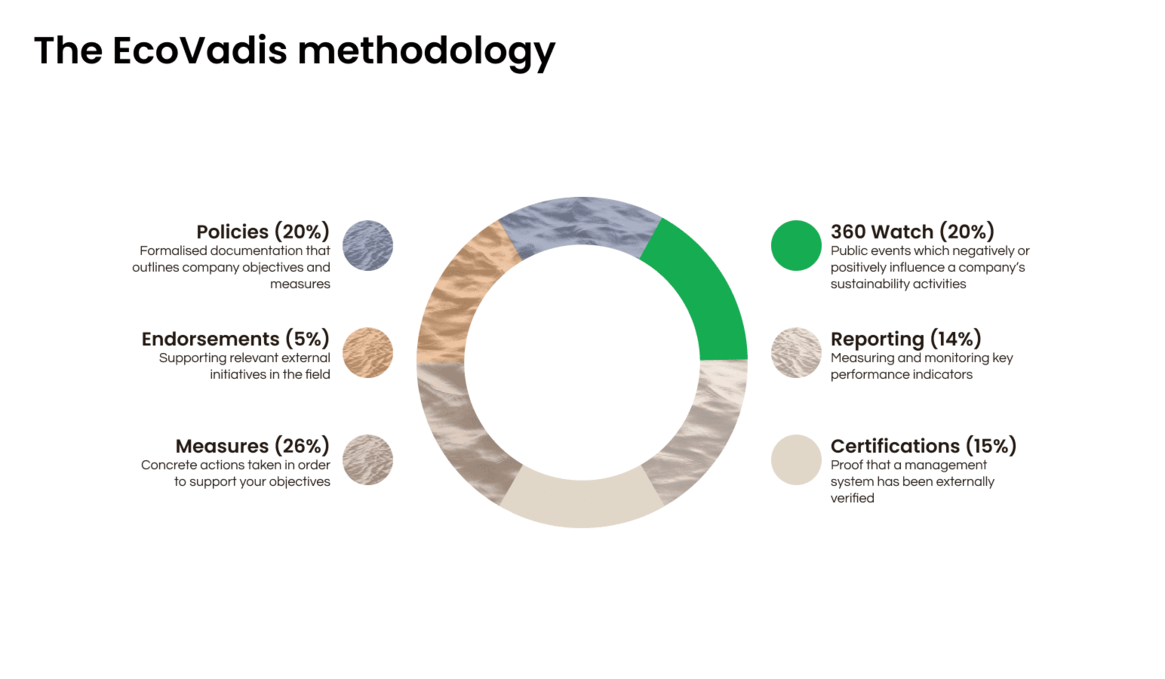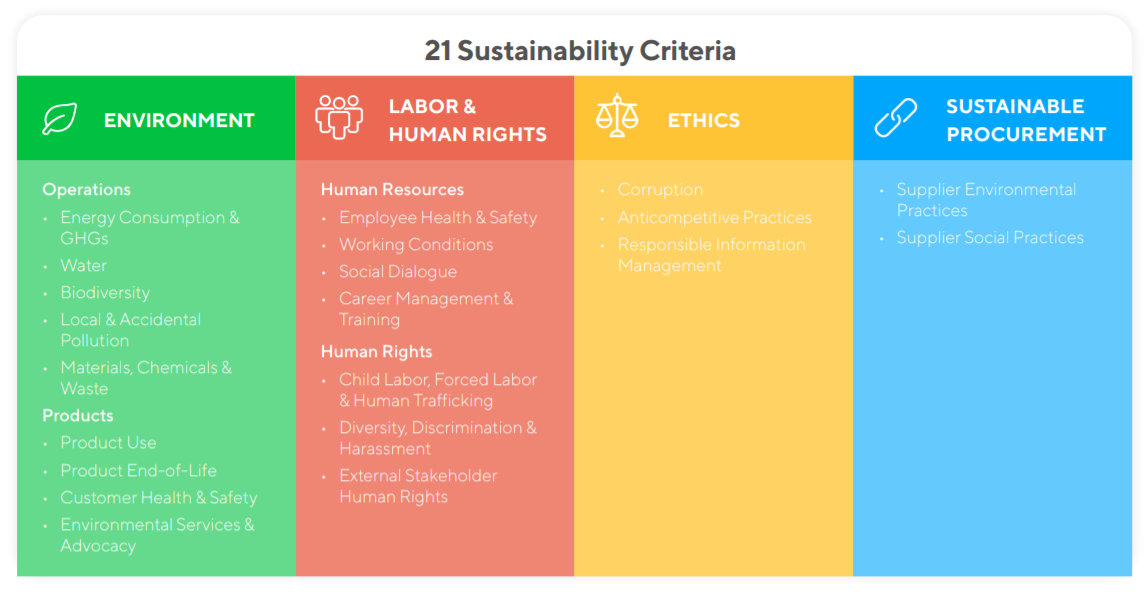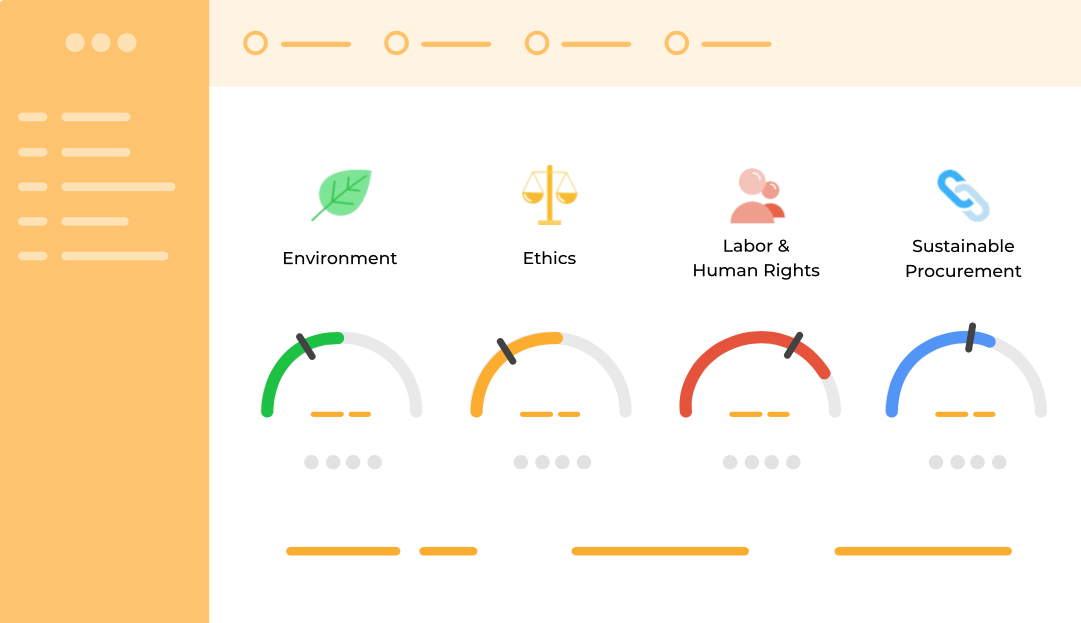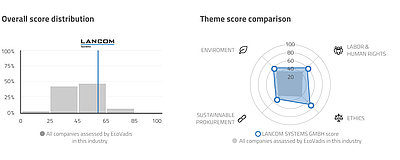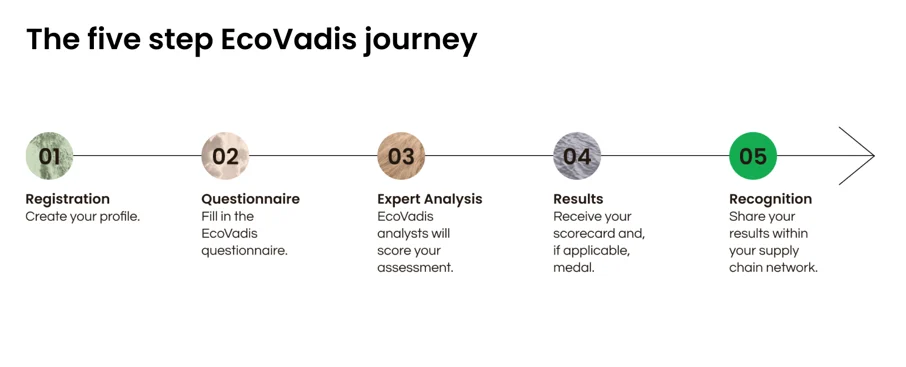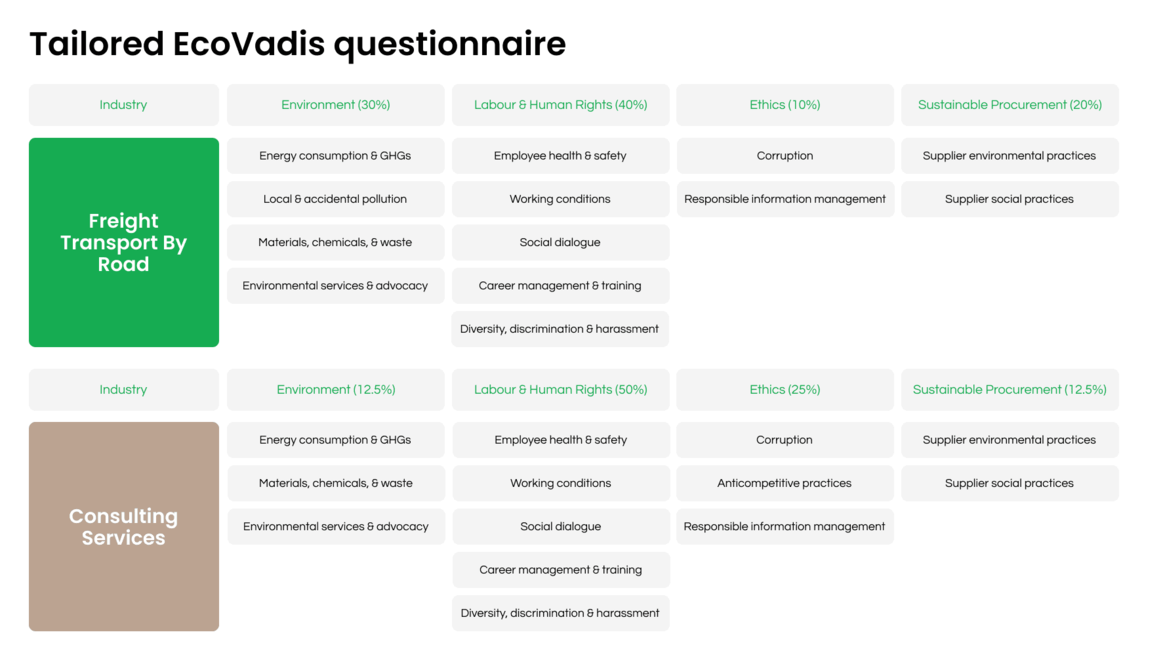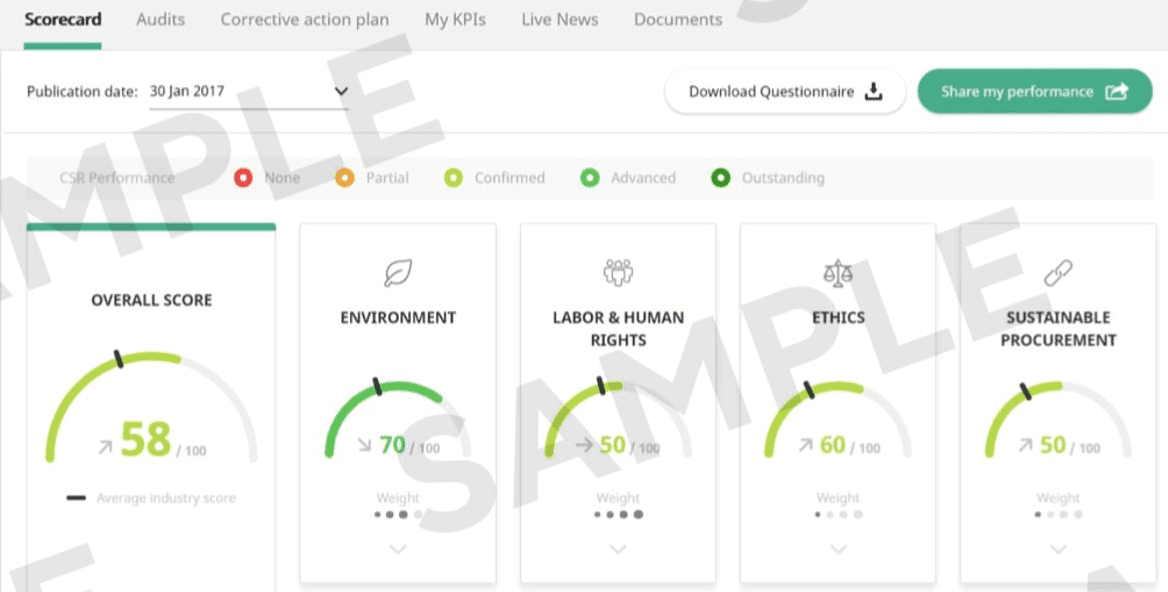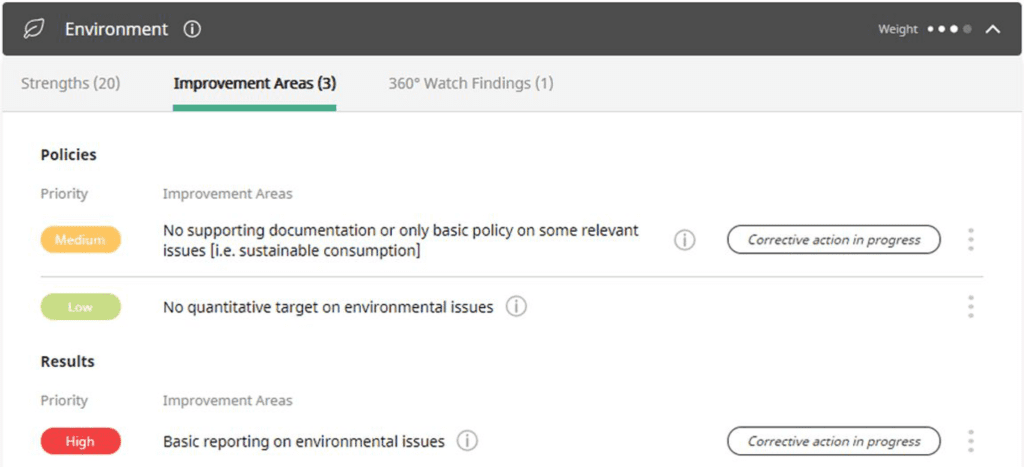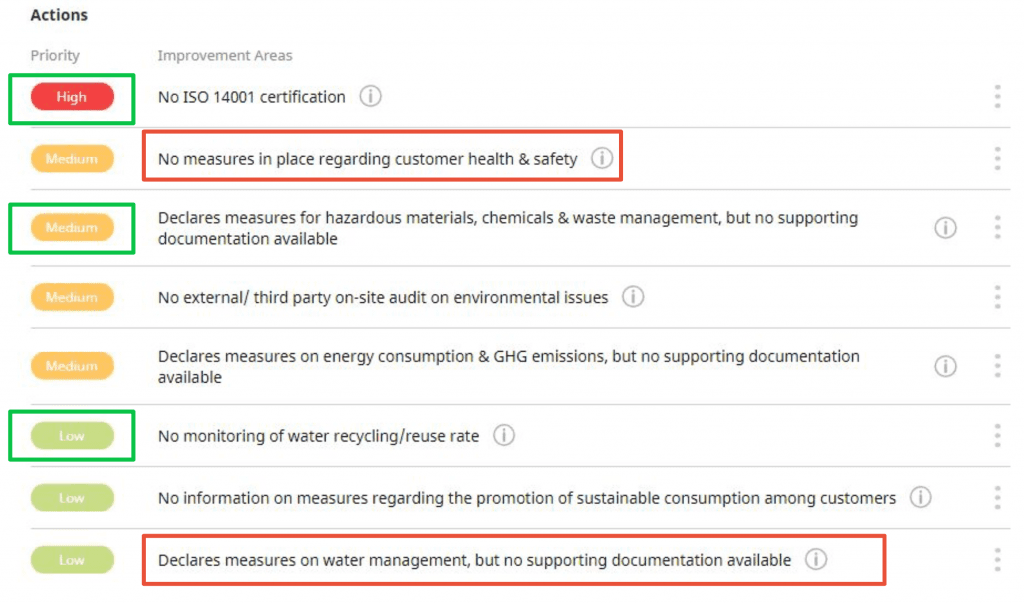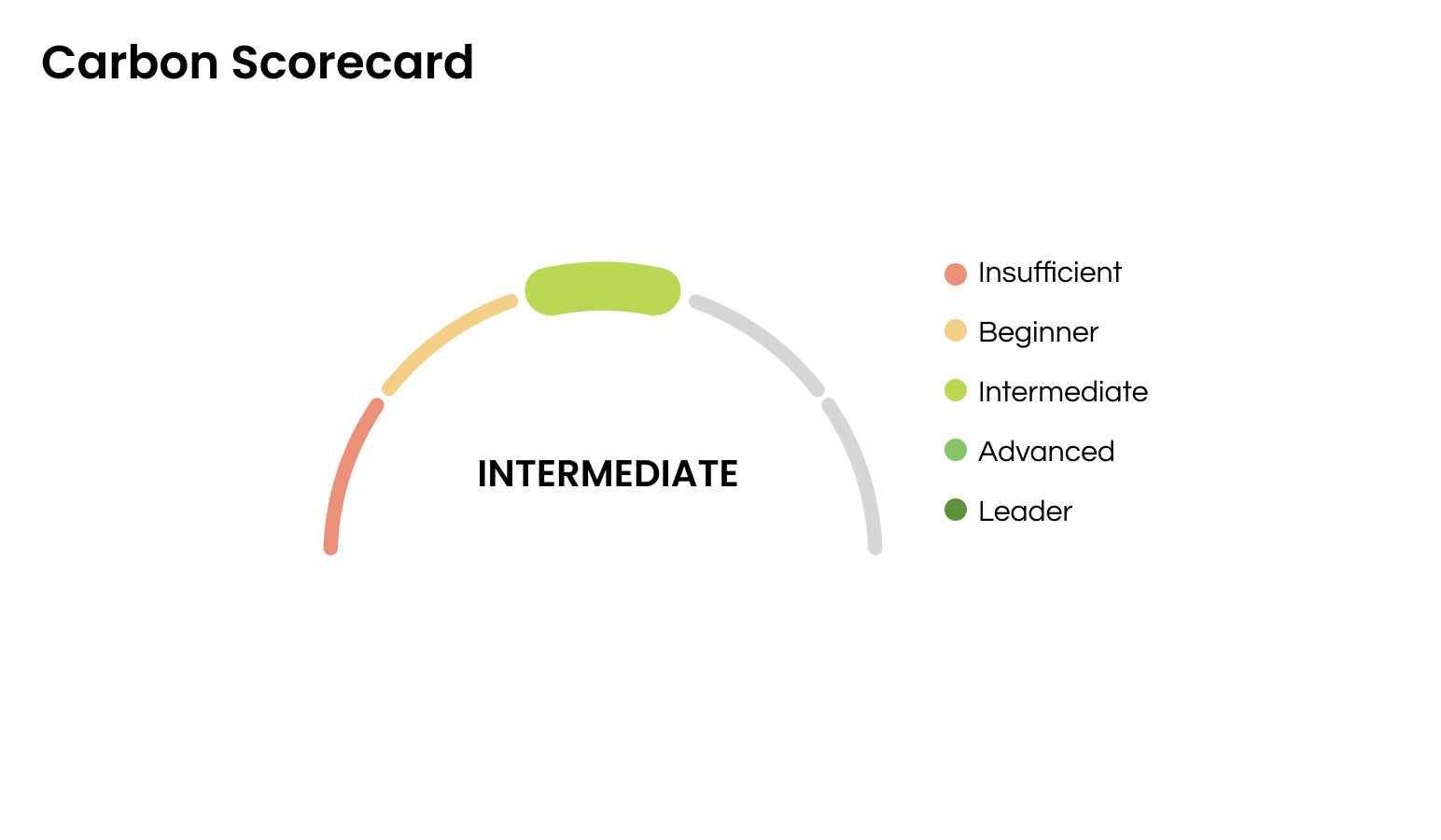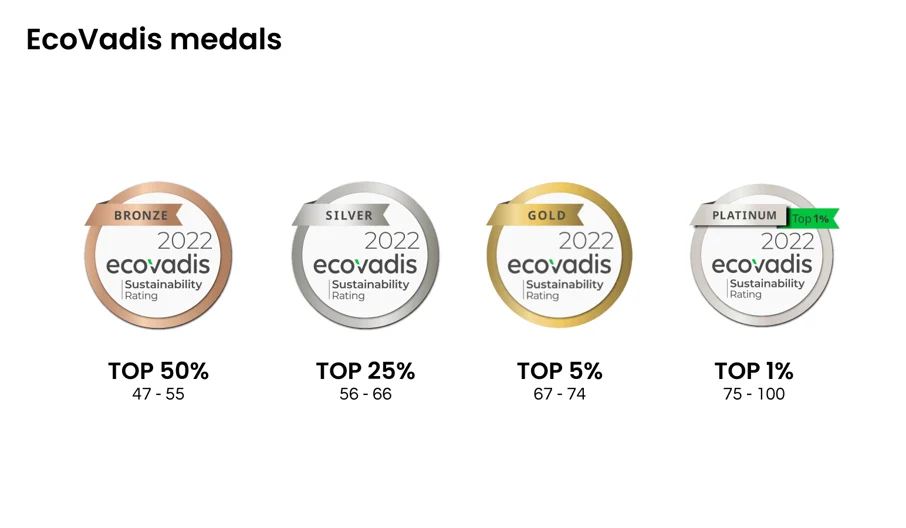ECOVADIS
Simple, Global, Reliable RatingsWhat is EcoVadis?
Founded in 2007, EcoVadis is today one of the world’s most comprehensive sustainability rating tools, assessing private and public companies on social, ethical and environmental impacts. Over the last decade, it has built a network of more than 65,000 rated companies around the globe.
The EcoVadis assessment is a paid service to rate a company’s material sustainability impact based on thorough documentation analysis (unlike many other ESG rating agencies that exist). The assessment is available to all companies and can be used as a tool to ensure transparency across the supply chain. Companies (or ‘buyers’) can request their suppliers to undergo the EcoVadis assessment by sending them an invitation, after which they will receive notifications on the process and results.
How does EcoVadis rate companies from industries with high environmental impacts?
The role of EcoVadis is to aggregate and analyze the sustainability information provided by rated companies (e.g., business partners, suppliers, portfolio companies, etc.) and communicate it to end users such as buyers and investors via sustainability rating. It gives companies actionable insights into their environmental, social and ethical risks.
The EcoVadis sustainability rating covers different industries, locations and company sizes which helps to contribute to business sustainability on a global scale. Our rating methodology was developed based on a “best-in-class” approach. This means we verify if the company reaches the best possible level for their business activity. For each industry category, we look at how the company integrates sustainability in every stage of their operations and their management systems.
EcoVadis chose this approach rather than an “exclusion” approach as a way to drive impact at scale and to engage all business stakeholders towards a sustainable transition. Focusing only on industries and companies with positive impact would lead us to exclude and disengage a significant portion of our economy. Some EcoVadis customers, including from procurement functions, are often limited by their product specifications and do not always have a lot of leeway to exclude specific materials from their sourcing (it is not always possible to find sustainable alternatives compatible with product specifications). Our customers are therefore interested in comparing the sustainability performance of companies within a given industry category, including industries with high environmental impacts. As a result, companies from resource-intensive industries can still achieve a high score if they have an advanced management system on environmental, labor & human rights, ethics and sustainable procurement issues and have implemented means to minimize their negative impact
What is the EcoVadis methodology?
EcoVadis analyses a company’s environmental or sustainability management system according to three aspects: policies in place, actions taken, and results. Let’s delve into each of these scoring categories.
Policies
Policies make up 20% of the overall score. As such, it is an important focus area when evaluating your environmental management system. Policies are crucial because they carry your mission, outline your value statements and guide your company towards implementing them.
To determine the score, the EcoVadis assessment looks at:
- Whether the policy in place covers relevant (“activated”) criteria depending on company size and industry;
- The presence of qualitative objectives;
- The presence of quantitative objectives (targets);
- The presence of sustainability reporting tools to monitor the objectives and track progress (governance);
- The presence of a review mechanism in order to keep the policy up to date;
- The scope of application: whether the policy covers all employees and all company sites
Endorsements
EcoVadis also looks at the external endorsements (5% of overall score) that the assessed company supports, in order to evaluate commitment and proactivity towards socio-environmental initiatives and industry-specific ambitions. Examples of such endorsements are commitments to the UN Sustainable Development Goals, the UN Global Compact, and CDP.
Measures
EcoVadis evaluates the actions taken to support objectives set in each of the four pillars (environment, labour, business ethics, sustainable procurement). Measures account for 26% of the overall score and as such, represent the most important category that EcoVadis evaluates. In other words, it forms the backbone of your environmental management system.
To determine the score, the EcoVadis assessment looks at:
- Relevance: whether the measures taken cover relevant (“activated”) criteria depending on company size and industry;
- Applicability: if the documentation attached properly answers the question asked;
- Validity: if the proof is valid enough (i.e., up to date, clear that the documentation belongs to the company);
- Coverage (how many sites or entities does your measure cover). The company’s “measures” score is heavily influenced by the coverage factor.
Certifications
To state the obvious: certifications provide external validation and quality assurance of a company’s management system, products, or services. Showcasing external certifications will have a positive impact on a company’s score as it represents 14% of the overall score. Examples of CSR certifications include ISO standards, SMETA audits, or SA8000.
To determine the score, the EcoVadis assessment looks at:
- Legitimacy (certificate issued by independent and accredited third-party organisation);
- Validity (the certificate is up to date);
- Inclusion of CSR issues;
- Coverage (how many sites does your measure cover). The company’s measure score is heavily influenced by the coverage factor.
Reporting
Proper reporting demonstrates that a company has set, measured, and monitored relevant key performance indicators (KPIs). It shows that company actions, as formulated in the policies, are oriented towards improvement. Sustainable reporting constitutes 14% of the total points allocated in the EcoVadis score.
To determine the score, the EcoVadis assessment looks at:
- Relevance: whether the KPIs in place cover relevant (“activated”) criteria depending on company size and industry;
- Transparency: whether the KPIs are publicly available to stakeholders;
- Timeliness: if the reporting is up to date (within last 2 years);
- Comparability: over time and to peers;
- Coverage: whether the reporting relates to the evaluated entity (the KPI cannot be from the parent company).
360° Watch
EcoVadis uses an artificial intelligence algorithm which searches for positive and negative news related to an organisation’s sustainability activities in the public domain. The 360 Watch accounts for 20% of the total points allocated. Depending on the findings, the 360° Watch management indicator will score a company as follows:
- Official statements or publications of administrative government bodies;
- The content of court rulings or legal settlements;
- Factual statements by the press or organisations, which are recognised as working by scientific standards and financially neutral to the content of said statements, e.g. independent NGOs.
According to the EcoVadis methodology, the 360° score is set at 75 points by default and may be scored up or down based on the following principles:
- Timing of facts of the case;
- Nature of case: positive or negative;
- Severity of cases with negative impact: severity may be due to a variety of factors such as repeated occurrence, percentage of workforce involved, amount of financial sanction, etc.
What are criteria of EcoVadis?
The objective of the EcoVadis methodology is to measure the quality of a company’s sustainability management system through its policies, actions and results.
The assessment focuses on 21 sustainability criteria that are grouped into four themes: Environment, Labor & Human Rights, Ethics and Sustainable Procurement. These criteria are based on international sustainability standards such as the Ten Principles of the UN Global Compact, the International Labour Organization (ILO) conventions, the Global Reporting Initiative (GRI) standards, the ISO 26000 standard, the CERES Roadmap, and the UN Guiding Principles on Business and Human Rights, also known as the Ruggie Framework.
The non-financial assessment by EcoVadis measures the sustainability management system of a company through 21 sustainability criteria focused on four key performance areas:
- Environment: impact from the production processes (energy consumption, water, biodiversity, local and accidental pollution, GHG emissions), impact from product use, and end-of-life
- Labor & Human Rights: Human resources management (accident prevention, staff training, working conditions, social dialogue) and Human Rights (respect for labor laws, diversity, discrimination)
- Ethics: corruption, anti-competitive practices, and information management responsibility
- Sustainable procurement: supplier environmental and social practices.
This overall score reflects the quality of the company’s and its supplier network’s sustainability strategy, actions, and performances at the time of assessment.
The three management layers are given the following weights: policies account for 25% of the scoring, actions for 40% and results for 35%.
The company scorecards can be easily shared with employees or customers and compared against peers in the industry, thanks to EcoVadis’ benchmark (see example below).
How to get certified?
The EcoVadis Certification process is a 5-step journey that starts with registration and ends with recognition.
Step 1: Registration
The first step to receiving an EcoVadis certification is to register on the EcoVadis website. You will be asked to create a company profile, specify your business activity and update your contact information. This information is then used by EcoVadis to build a customized questionnaire for your company based on your industry sector, the country of operations and the size.
If your company was invited to undergo an EcoVadis assessment, you should follow the link in the email invitation. This will allow the requesting company to follow your progress and be notified when your results go live.
Step 2: Questionnaire
Once the registration is complete, you will receive an email with your username and the instructions and link to create your password to access the platform.
Upon entering the platform, you will land on the Dashboard page where you can check the progress you made, the latest news from EcoVadis, and where you can start completing the questionnaire. As mentioned before, the questionnaire is customized to your company, as shown by the example below.
You can now start filling in the questionnaire by answering the questions and uploading the required documents.
Step 3: Expert analysis
Once you have completed and submitted your questionnaire, appointed EcoVadis experts will analyse your answers and the documents uploaded to check whether your answers are supported by the right documents and respect EcoVadis criteria. The process itself takes approximately 6 to 8 weeks.
Step 4: Results
Once your answers have been analyzed and results are published, you will be notified via email. Your answer will be distilled into a Scorecard, as shown in the example below. In the Scorecard, you will find:
Your overall score with the average industry score (black marker);
The scores across the four sustainability themes and average industry score per theme;
Each pillar’s weight (from 1 to 4).
Sample scorecard
In addition to your main scorecard, you will also be able to access detailed scorecards per sustainability pillar, as shown in the figure below. In this section, you will find what EcoVadis considers to be your company strengths, meaning everything your company has in place which helps it implement its sustainability strategy (e.g. good environmental policies, recruitment process clearly communicated to candidates). Also, remember that strengths should never be overlooked as what is a strength today might become an improvement area tomorrow. In other words, EcoVadis focuses on continuous improvement, meaning there is no sustainability ‘end state’.
In the detailed scorecard, you will also find the specific improvement identified by EcoVadis analysis, as shown in the example below. Improvement areas can be categorized according to three levels:
- Low importance (Green);
- Medium importance (Orange);
- High importance (Red).
The EcoVadis Carbon Scorecard
As of 2021, EcoVadis systematically asks questions about the state of your climate strategy by requiring in-depth information regarding:
- Commitment
- Actions
- Reporting
This will lead to a separate scorecard providing a specific ranking to your organisation’s Carbon Management Level. The results are ranged from Insufficient to Leader.
The scorecard will be divided into strengths and improvement areas, in the same way as the sustainability scorecard.
Beginning 2022, the results are still not impacting your overall EcoVadis score. However, considering the increasing focus and pressure on private sector carbon reduction plans, this might not be the case for very long.
What can you do to improve you Carbon Scorecard?
Similar to the EcoVadis scorecard that you are used to, the platform provides strengths and improvement areas on each of the score pillars. For Commitments, organisations are rated on the strength of their targets. Sumitting a Science-Based Target, for example, could impact the score in this area.
Under Actions, organisations are rated on their activities related to reducing emissions.
Finally, Reporting assesses organisations on the completeness and relevance of the data that is reported. Some things to consider are having an updated inventory and reporting on scope 1, 2 and 3 emissions.
Step 5: Recognition
Once you receive your score, you might also receive your EcoVadis medal. No medals are assigned for overall scores below 45 or if there is a theme score that is lower than 20. A company can receive a bronze medal (45>), silver medal (54>), gold medal (66>), or platinum medal (73>).
The medal reports the year in which the assessment was completed and can be used on your company’s website and in communications. In addition, you will be able to share the results on the EcoVadis website with other companies in your supply chain network. EcoVadis’ sustainability scorecard is valid for 12 months after publication. Once the 12 months have passed you will still be able to access your scorecard but will no longer be able to share the results publicly. You can find more information on your scorecard validity in your EcoVadis platform, next to the publication date
What is EcoVadis prinsiples?
The evaluation is driven according to 7 EcoVadis founding principles:
- Evidence-based: the rated company must provide evidence and supporting documents and is responsible for them (strategic notes, certificates, reports)
- Industry, location, and size matter: the assessment takes into account specific issues related to the sector, presence in risky countries, size, and geographic scope
- Diversification of Sources: The rating takes into account standpoints published by NGOs, trade unions, international organizations, local authorities, or other third-party organizations (e.g., auditors, CDP, external compliance database)
- Technology is a must: the EcoVadis IT system integrates learning, growth, rapid scalability and facilitates industrialization
- Assessment by International Sustainability Experts: the documents are analyzed by an international team of experts up to date with the latest best practices in sustainability
- Traceability and Transparency: the documents are stored securely and can be traced back. Rated companies may access to the most detailed results and to each scoring decision
- Excellence Through Continuous Improvement: EcoVadis has implemented and operates a company-wide quality management system supported by a client advisory board and a scientific committee.
Who is EcoVadis for?
The EcoVadis rating is available to all companies and suppliers, excepting the companies operating in Manufacture of tobacco products (ISIC code 1200), Mining of coal and lignite (ISIC division 05), Manufacture of weapons and ammunition (ISIC code 2520), Manufacture of air and spacecraft and related machinery (ISIC code 3030).
The EcoVadis company users can be:
- Either a client company whose procurement executives request their suppliers to answer EcoVadis. Then they get access to easy-to-use scorecards and are allowed to monitor the sustainability performance of their business partners as well as their continuous improvement actions.
- Either suppliers that are requested to answer a client’s request. After being rated, the suppliers may share their scorecard results with the member community or other share on the platform. This possibility may increase their business opportunities. This sharing requires their authorization, and the platform ensures the confidentiality of their sensitive information
Why get certified through EcoVadis?
An EcoVadis certification can bring multiple benefits to an organisation, among which:
- Better understanding of your organisation’s environmental management system (understand your strengths and weaknesses with regards to the Environment, Labour & Human Rights, Ethics, and Sustainable Procurement themes);
- Increased supplier selection likelihood and evaluation scores due to transparency on socio-environmental performance;
- Increase Stakeholder trust and gain legitimacy;
- Industry benchmarking opportunities;
- Better insights into the material issues specific to one’s organisation;
- Ability to share your scores with your partners.
How long is the recognition valid?
EcoVadis scorecards are valid for 12 months after publication.
Once the 12 months have passed, the company will still be able to access its scorecard (and the ones of suppliers) but will no longer be able to share the results publicly.
Tips & Best Practices from Our Experts?
Assigning Responsibilities
- Assign a project manager
Assigning a responsible person that oversees the project will greatly help the organisation. This person should be responsible for gathering all documentation from all pillars, keeping a document database, as well as filling-in the survey online. Throughout the years, having an ambassador for opening the new questionnaire and taking care of platform-specific matters (e.g., opening the questionnaire, making sure the deadline is met, sharing EcoVadis results with commercial partners) will be valuable to centralise the information.
- Assign a specific contact person per pillar.
These individuals are most knowledgeable on the pillar-specific internal operations and should closely work with the project manager to provide information and documentation. Here is a list of commonly responsible roles to involve in the EcoVadis process, per pillar:
-
- Environment: EHS Manager, Quality Manager, Sustainability Manager.
- Labour & Human Rights: HR Manager, EHS Manager, Sustainability Manager.
- Business Ethics: Finance Manager, IT Manager, Compliance manager
- Sustainable Procurement: Procurement Manager, Account/Product Manager Sustainability Manager.
Making Sure Your Documentation is Accepted
Your EcoVadis assessments predominantly relies on the documentation submitted on the platform. This is why making sure that documentation is taken into account by EcoVadis is essential. Here are a couple of mistakes to avoid when it comes to the type, age, and format of documentation:
- Obsolete Information
Make sure your documents are up to date. EcoVadis will generally reject documents older than 8 years. When it comes to KPIs and audit reports, the validity period is as early as 2 years.
- Unauthentic documentation.
EcoVadis needs to understand that the documentation provided belongs to the organisation being assessed. This is why we highly recommend always having a company name or logo on the documentation presented. Similarly, documents from external parties will be rejected, unless this specific document makes reference to your organisation. For the same reason, pictures will be rejected.
- Providing Context
The EcoVadis assessment being a documentation audit, some essential elements of sustainability management systems can sometimes be left out. However, EcoVadis provides opportunities to contextualise its documents and give additional information.
- Comment boxes
Attached to each question in the survey are comment boxes which allow organisations to give context to the document. We advise making use of these comments, especially when the document provided needs clarification. Think about elements like “who is in charge of the process”, “how frequently is the procedure revised”, or “when was this action created “.


